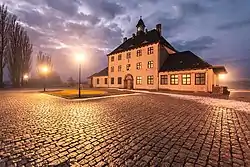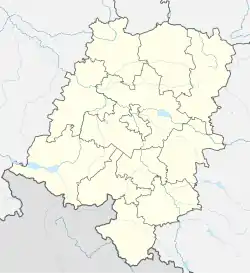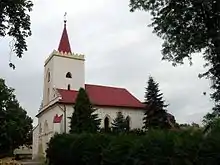Zalesie Śląskie
Zalesie Śląskie [zaˈlɛɕɛ ˈɕlɔ̃skʲɛ] (German: Salesche) is a village in the administrative district of Gmina Leśnica, within Strzelce County, Opole Voivodeship, in south-western Poland.[1] It lies approximately 7 kilometres (4 mi) east of Leśnica, 10 km (6 mi) south of Strzelce Opolskie, and 37 km (23 mi) south-east of the regional capital Opole.
Zalesie Śląskie | |
|---|---|
Village | |
 Railway station in Zalesie Śląskie | |
 Zalesie Śląskie  Zalesie Śląskie | |
| Coordinates: 50°25′N 18°16′E | |
| Country | |
| Voivodeship | Opole |
| County | Strzelce |
| Gmina | Leśnica |
| First mentioned | 1223 |
| Population | 1,468 |
| Time zone | UTC+1 (CET) |
| • Summer (DST) | UTC+2 (CEST) |
| Vehicle registration | OST |
| Website | http://www.zalesieslaskie.pl |
The village has a population of 1,468.
History

The village was first mentioned under its Old Polish name Zalese in 1223, when it was part of fragmented Piast-ruled Poland.[2] Its name comes from the Polish word las, which means "forest", and is typical of the area.[2] In the 18th century it was annexed by Kingdom of Prussia, and from 1871 to 1945 it was part of Germany. The Germanized name Salesche appeared in 1845, and in 1935, the German administation renamed the village to Gross Walden to erase traces of Polish origin.
In the final stages of World War II, in May 1945, a group of Polish and Soviet prisoners of war from the German Stalag VIII-A prisoner-of-war camp was liberated in the village by the advancing Soviet troops.[3] Afterwards the village became again part of Poland, and its historic name was restored, with the addition of the adjective Śląskie after the region of Silesia within which it is located, for distinction from other settlements with the same name.
References
- "Central Statistical Office (GUS) - TERYT (National Register of Territorial Land Apportionment Journal)" (in Polish). 2008-06-01.
- "Pradzieje i średniowiecze". Strona internetowa miejscowości Zalesie Śląskie (in Polish). Retrieved 8 November 2020.
- Lusek, Joanna; Goetze, Albrecht (2011). "Stalag VIII A Görlitz. Historia – teraźniejszość – przyszłość". Łambinowicki rocznik muzealny (in Polish). Opole. 34: 45.
